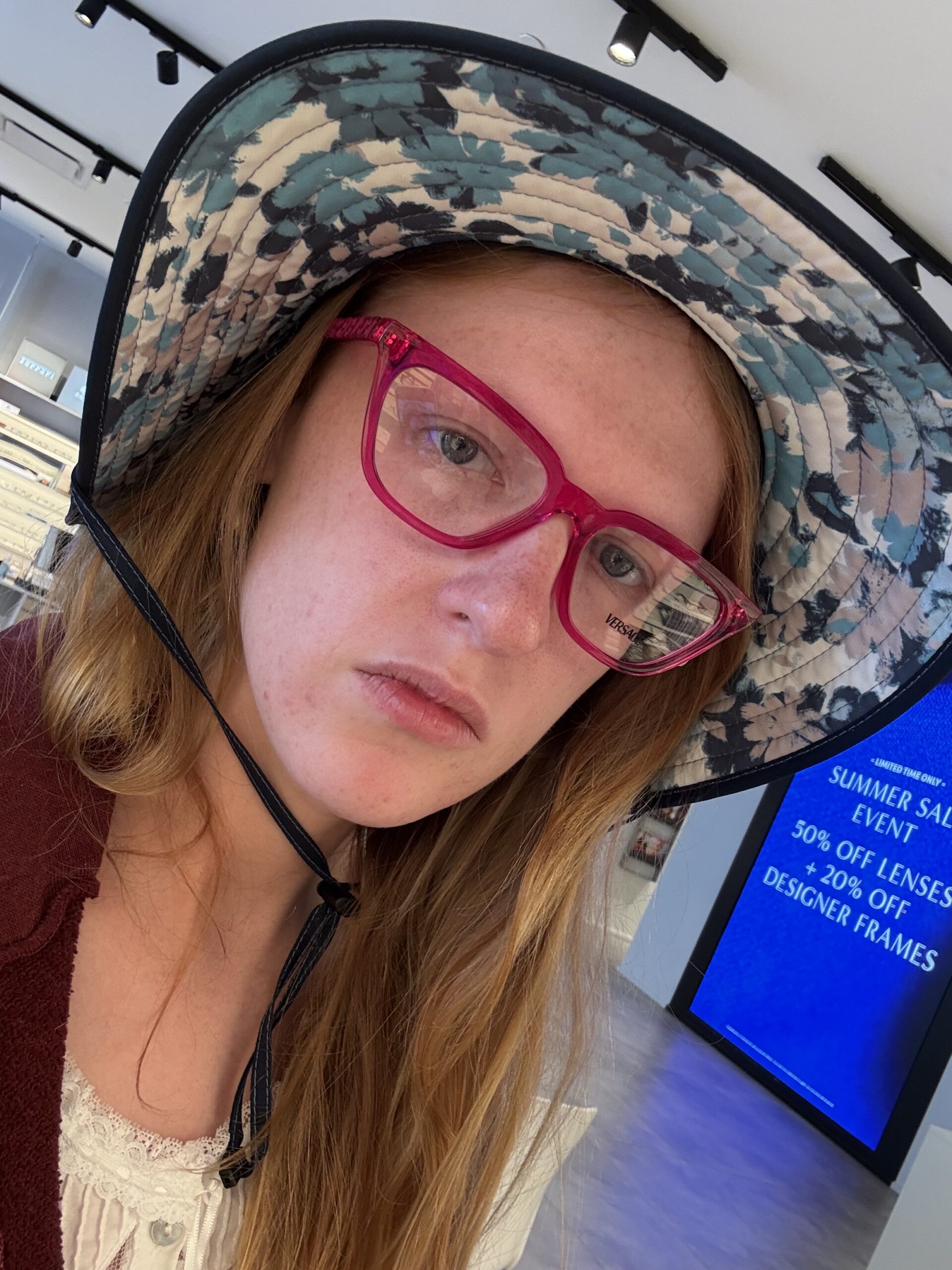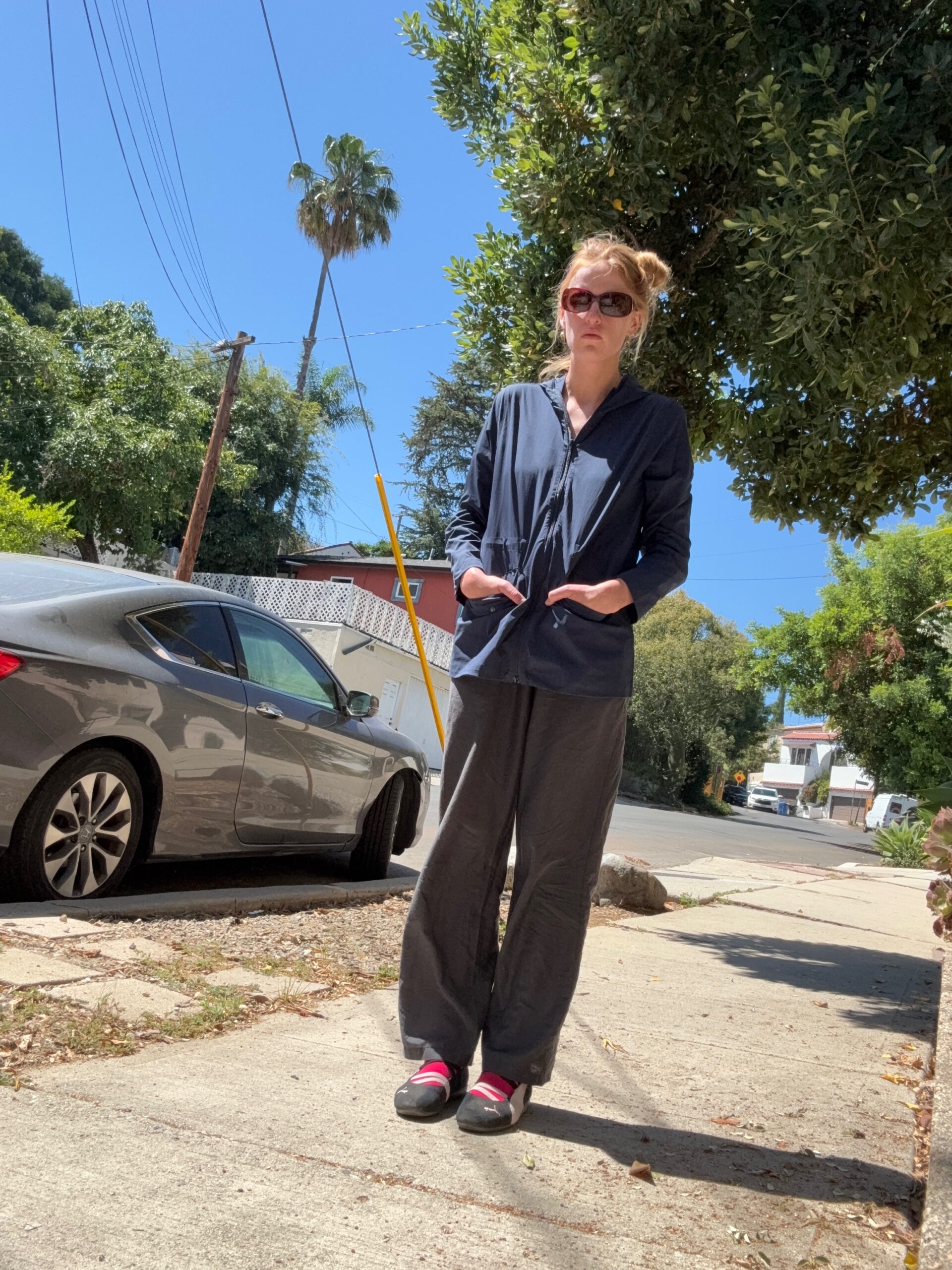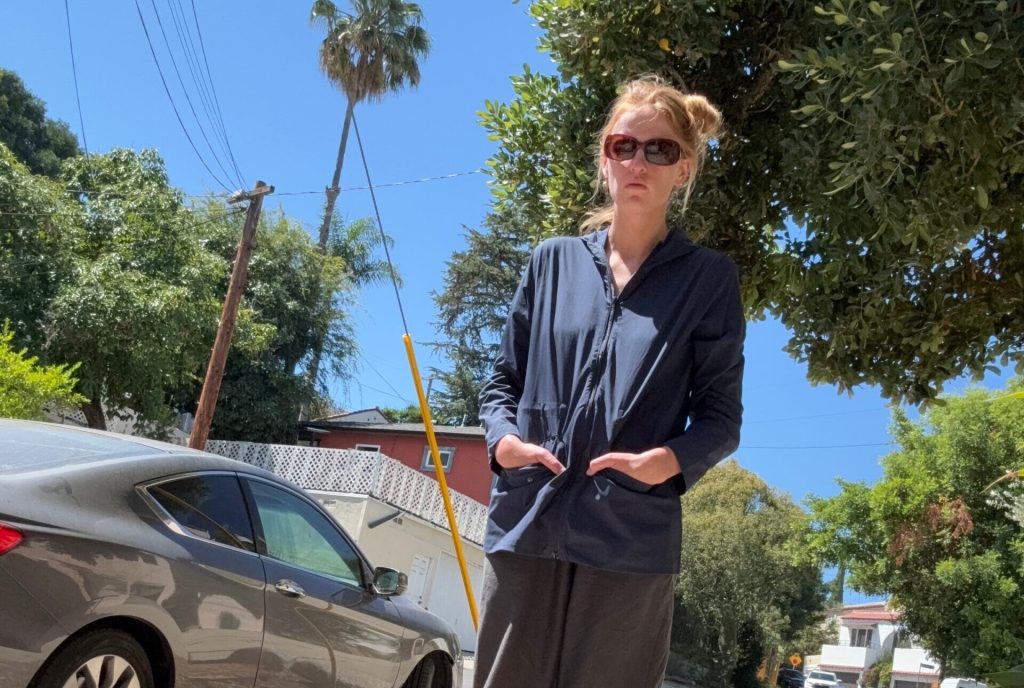
Photos courtesy of Audrey Hobert.
For most of her life, Audrey Hobert was the mastermind behind the scenes. She co-directed her brother Malcolm Todd’s music video “Concrete,”co-wrote her best friend and ex-roommate Gracie Abrams’ chart-topping sophomore record The Secret of Us, and pitched jokes in the writers’ room for Nickelodeon’s The Really Loud House. Now, the 26-year-old singer-songwriter is finally taking center stage with her early-2000s-romcom-inspired debut album Who’s the Clown, a witty and relentlessly catchy confection of pop hits that dropped last Friday. Suffice it to say, she’s come a long way since being in the ensemble of her California high school’s productions of Evita and In the Heights. “I never got a lead my whole life, and that’s why I say I’m doing this job now,” Hobert told her friend and fellow theater kid Sadie Sink on a Zoom last week. As the Tony-nominated John Proctor is the Villain star called in from London, she and Hobert reflected on song craft, stage fright, and staying offline.—SIMON DWIHARTANA
———
AUDREY HOBERT: Sorry I was a minute late. I was on a Google Meets call.
SADIE SINK: Oh, no worries. What time is it there? Are you in L.A?
HOBERT: Yeah, it’s just about noon. And you’re in London, right?
SINK: Mm-hmm.
HOBERT: Okay, fun. So it’s like, eight o’clock.
SINK: It’s eight o’clock and it’s so hot. They don’t believe in AC here.
HOBERT: I know, because I just went for the first time and I stayed at my friend’s flat and I had a horrible night’s sleep because it was so hot.
SINK: It’s really intense. Were you playing a show here?
HOBERT: Yes, I was playing a show in London and I had never been out of the country until just this past trip. So it was great, but I think there’s something picturesque about a fan in the room.
SINK: Totally. I’ve been putting ice cubes in a bowl of ice in front of the fan.
HOBERT: Oh my gosh. Are you just staying there by yourself? Where is home for you?
SINK: New York. I’m from Texas originally, but I’ve been in New York on and off since I was 10. And you grew up in L.A?
HOBERT: I grew up in L.A. We met in L.A. once, actually.
SINK: I’m glad you remember it because I think about it all the time.
HOBERT: Really?
SINK: I remember that party because I was severely underdressed. But beyond that, I was thinking about it recently while listening to your song “Bowling Alley.” You’re talking about the impression you leave on a party in a group of people, and I just know from that one encounter we had that you leave a very positive impression.
HOBERT: That’s so sweet.
SINK: I always remembered you. It’s been so nice to just track your success this past year.
HOBERT: Oh, stop.
SINK: I’ve been rooting for you.
HOBERT: That’s so funny because I was in the audience watching you perform in New York in John Proctor [is the Villain]. I know you started in theater, right?
SINK: Mm-hmm.
HOBERT: Yeah. One of the questions I had for you was, do you also think that there is no artistic medium like theater?
SINK: Oh, absolutely. It’s the hardest thing you’ll ever do, but so worth it. Were you a musical theater kid in school?
HOBERT: Oh, hell yeah.
SINK: What shows did you do? I have to know.
HOBERT: So freshman year we did Guys and Dolls. I was just in the ensemble, but I was a boy.
SINK: No small parts. No small parts.
HOBERT: I know. I know. I wish someone would’ve told me that, or I wish I had felt that way at the time. And then sophomore year we did In The Heights, which was so cool.
SINK: How do you do In The Heights at a high school? I feel like that’s so ambitious.
HOBERT: Well, are you familiar with Pali High?
SINK: No.
HOBERT: It’s a public school in Los Angeles, and basically for In the Heights, half of the football team ended up auditioning. I don’t know how it happened. But all of the male leads were stars of the football team and really, really talented actually. Then junior year we did Evita, which I didn’t care for, unfortunately.
SINK: That’s the worst though, when the school chooses the musical and you get stuck with the one that you’re not a fan of.
HOBERT: Yeah. And then senior year we did Spring Awakening.
SINK: Oh, that’s a dream. And good on your school for letting you do it, too.
HOBERT: Oh, I mean, I wasn’t one of the three main girls, but I was Anna. I never got a lead in my whole time, and that’s why I say I’m doing this job now. Because I never got the lead. But have you ever been in a production of Spring Awakening? I feel like you’d be very good.
SINK: No, I haven’t. It’s always been a dream of mine, but I’ve got to act fast before I grow out of it, I guess.
HOBERT: I really want to tell you, your entrance in John Proctor is one of the greatest, best things. And that whole cast is unbelievable. The direction. Danya [Taymor], I’d love to meet her. What is she like?
SINK: She’s so, so amazing. She led so many incredible conversations and rehearsals, but she really understands the teenage experience. And she got it right in Outsiders too. I’m glad you liked the entrance because that’s what I hated the most. It was my least favorite part of the show.
HOBERT: Why? Because of the applause?
SINK: Well, that is sometimes super awkward depending on how bold the audience is but also because I think it’s just awkward for the character too. She just is rambling and is digging herself into a hole she can’t climb out of. I don’t think I’m a naturally very funny person, so doing something more comedic was new for me, I guess.
HOBERT: I thought you were so funny in it. You don’t enter until 20 minutes in, and in the show I saw it was roaring applause. That’s the funny thing about theater to me, there’s nothing like it because you’re so in it. And then people are clapping and you have to pause.
SINK: It’s so funny. There’s all these little made-up rules that you have to follow. But I had a question for you because you were in screenwriting for a while?
HOBERT: Yes, at Tisch.
SINK: Wow. And then you wrote for Nickelodeon, I’ve read?
HOBERT: I wrote for a Nickelodeon show.
SINK: Wow. Which show was it?
HOBERT: It was called The Really Loud House. I don’t know if you feel this way being an actor, but when I was very young I had performer qualities. But around high school, I started to feel like what’s actually really cool is to be behind the scenes. From a purely vain standpoint of not wanting to ask for attention, but secretly really wanting it. So I was like, “I’m going to be a writer. The coolest thing you can be is a writer.” So then I went to school for it. But yeah, I started writing for Nickelodeon. That was the most imposter syndrome I’ve ever had. And the nature of a writers’ room is so competitive because you’re wanting to get your storyline in and your joke in. And I’m not a very naturally competitive person. I found it hard at times. Often I’d think of a joke, wouldn’t say it out loud, and then two minutes later someone would say it and get roaring applause. But it was great and formative. I actually think how it helped me with the music stuff, aside from just the writing part, was that I learned how to pitch. So when I started meeting record labels and going in to pitch myself as an artist, I knew exactly how to and it worked. It was like a script. And I attribute that to having been in a writers’ room for two seasons.
SINK: That really comes across in your music videos. I watch it and I just know, “Oh, she had a vision. She knew how to execute it perfectly and no one was going to sway it.”
HOBERT: That’s so sweet.

SINK: Was it hard to convince people of your ideas? Or was it hard to find collaborators that supported it?
HOBERT: Yeah, that’s a good question. Have you watched the Pee-wee Herman documentary that came out on HBO?
SINK: No, I haven’t.
HOBERT: Your question just made me think of it, because it has two parts: The first part is about him becoming Pee-wee Herman and having the show. He was such a crazy control freak because he had such a specific vision, and as I was watching it, I was like, “Oh gosh, am I Pee-wee?” That’s a good thing. When you know so specifically what you want, sometimes it’s easy to get frustrated if people aren’t moving as fast as you, but I just don’t think it’s a good quality to be rude to the people you work with just because they’re not in your brain, I guess. But it’s been very easy, and I think it was exciting for RCA, the label that I signed with. I don’t think it’s often that artists come in and want to be in charge of the visual stuff. Do you remember being a kid and hearing a song on the radio and someone singing it and being like, “Obviously the person who’s singing wrote this song?”
SINK: Oh, totally.
HOBERT: But so many people don’t write their own music.
SINK: No. Especially back then, the pop music we grew up on was part of a pop machine.
HOBERT: A machine.
SINK: I know very little about the music industry, but what I see is that you’ve just tapped into what everyone’s craving, which is that genuine pop sound that’s reminiscent of the early 2000s, but with also really smart, delightfully comedic lyrics. And wrapped up in this package that is fully authentic and is clearly your vision and who you are. That’s what people have been wanting, so obviously your success just comes as no surprise to me.
HOBERT: Oh, that is so sweet. Forgive me if you’ve been asked this a million times, but did you have any nerves to do the dancing that happens at the end of the show?
SINK: I wanted to talk about this with you, actually.
HOBERT: Okay.
SINK: At first, a little bit. In rehearsals, I did feel a little bit ridiculous. I mean, I’m a musical theater kid. I’ve spent time in dance classes and whatnot, but this was just a little bit different. And once we had the choreography, then I felt like that held me. But that ending bit where it gets just a little bit like exorcism-like, that’s all made up on the spot. And it’s like, “All right, now just go feral and let out your demons.” But honestly, there’s something really nice about being up there and having one job, and that is to act crazy.
HOBERT: Flail. Do you ever find yourself in that dance thinking, “I know what I want for dinner, and I’m so excited?”
SINK: Not that. I would just not think of anything at all.
HOBERT: That’s beautiful.
SINK: My mind would just go completely blank.
HOBERT: That’s why people dance. That’s why people work out. That’s why I was addicted to Pilates for one whole calendar year, because it was the only space in the world where my mind would go actually completely blank, and then it was meditative. And then I was also getting shredded at the same time. I was like, “I’m just winning.”
SINK: Totally. It’s a win-win.
HOBERT: Can you watch yourself act?
SINK: It depends. For ADR, you’re forced to watch yourself and it’s horrible. I had to do it the other day. I can do it, but I’ll just cover my eyes and ears a little bit and slowly have to get comfortable with it. What about you? After a concert do you go and watch all the videos?
HOBERT: Hell no. I don’t keep TikTok on my phone for that specific reason, because it ruins it for me. And obviously we’re all our own harshest critics. But I don’t want it to be a habit that I finish a show and then relish in the online attention. I just don’t think it’s going to be very conducive to me making something new anytime soon. I compare it to—and I hope you can relate—knowing that people are talking about you online, it’s the same thing as being in a room and there’s a group of people in a corner and you know they’re all talking about you. It’s impossible to not want to eavesdrop.
SINK: That’s a great rule to live by. And it’s so hard sometimes. I’ve generally approached everything with that same mindset and just stayed offline. But there are times where you do want to see what people are saying. I felt that a lot at the beginning of John Proctor, just because I cared so much. But even if you’re looking at really positive comments from people, it starts to mean nothing because you’re just looking for the bad one.
HOBERT: Does that happen? Will you see one thing that clocks you in such a way that it stays with you?
SINK: Oh, yes, totally. I don’t know why we put ourselves in situations sometimes where we’re looking for it. So I’m glad that we both could realize that and know that maybe we should step away.
HOBERT: Yeah. Also, it’s more than fame or success. I just want to be well-adjusted. Because I want kids one day. I think a normal life is actually the most beautiful thing you could have. I think there were times before I started writing this album where I would be like, “All I want is for people to respect me for what I can do artistically.” And then you hear people say about winning major awards, it’s not the exciting, life-affirming feeling that you want it to be. It’s just another night. That being said, I love award shows. Do you feel the same?
SINK: Me too. I love watching award shows. Going to them is a little bit different. It’s really nerve-wracking, I find. Have you written for an award show ever?
HOBERT: No, oh my god. But that would be so fun.
SINK: You’d be so good at it.
HOBERT: I would adore it. My favorite is the Tonys. And this past Tonys was, I mean, just the Cole Escola of it all. I’m sure you saw that show.
SINK: Oh my god, Cole was incredible in it. Also, you have to write a musical episode for a TV show. You need to blend your two passions.
HOBERT: Well, I still want to be a writer for SNL. I still religiously watch that show. Have you ever been on it?
SINK: I’ve never been on it. I would secretly love to host it one day, but that also feels so nerve-wracking.
HOBERT: It seems like the most nerve-wracking thing of all time. I remember when Austin Butler hosted it and he impressed me so much. Same with Travis Kelce. And then Ariana Grande was so good. Honestly, I don’t want to even host it, I just want to be a staff writer on that show.
SINK: That would be a stressful environment.
HOBERT: I know, but I feel like I’d love it. Staying up all night, it honestly sounds like theater.
SINK: It does, yeah.
HOBERT: It’s been so nice to talk to you.
SINK: I know, it’s so nice to talk to you. Look, the sun is completely set. I’m in the dark.
HOBERT: Oh my god.
SINK: I had so much fun.
HOBERT: I’d love to hang sometime, whenever we can.
SINK: How can you find me?
HOBERT: I don’t know, but I’m going to find a way, girl.

